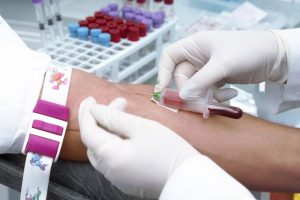 A blood test of the future may be able to predict a person’s risk of stroke. Canadian researchers measured levels of blood-borne chemical signals (biomarkers) in the blood of over 3,200 people.
A blood test of the future may be able to predict a person’s risk of stroke. Canadian researchers measured levels of blood-borne chemical signals (biomarkers) in the blood of over 3,200 people.
The participants were tracked for nine years on average. Over the course of the study period, 98 of them suffered a stroke.
Advertisement
The researchers found that elevated levels of four biomarkers were associated with a higher risk of stroke.
Elevated blood levels of homocysteine (one of the biomarkers) indicated a 32 percent higher risk of stroke, compared to people with the lowest levels of the chemical. Elevated levels of vascular endothelial growth factor, C-reactive protein, and tumor necrosis factor receptor 2 (three other biomarkers) also signaled a higher risk of stroke.
Lead author Dr. Ashkan Shoamanesh said, “Identifying people who are at risk for stroke can help us determine who would benefit most from existing or new therapies to prevent stroke.”
Although the research looks promising, it is still too early for any definite conclusions. Additional research is required before the blood test is introduced in the medical offices as a means of monitoring the risk of stroke.
